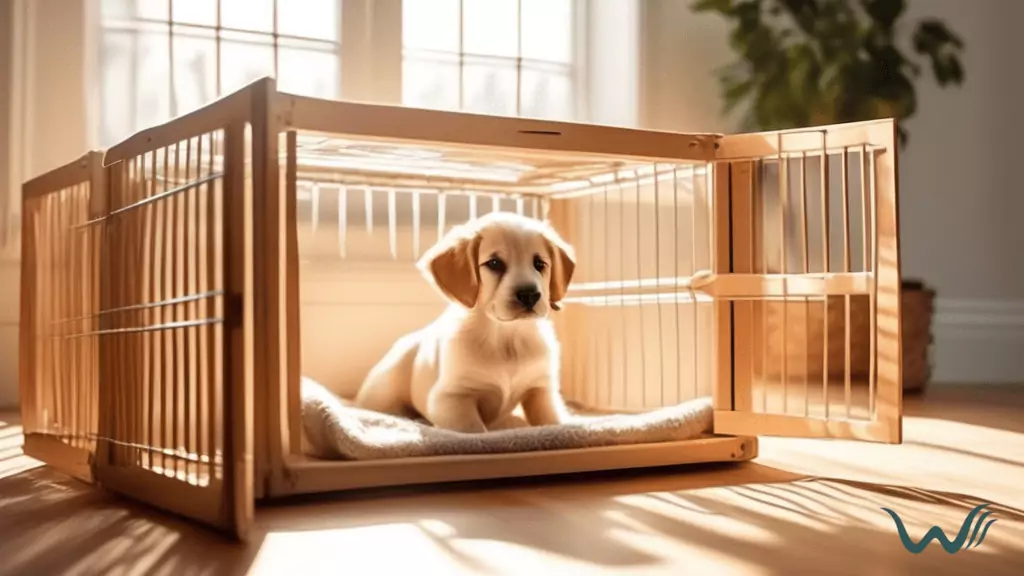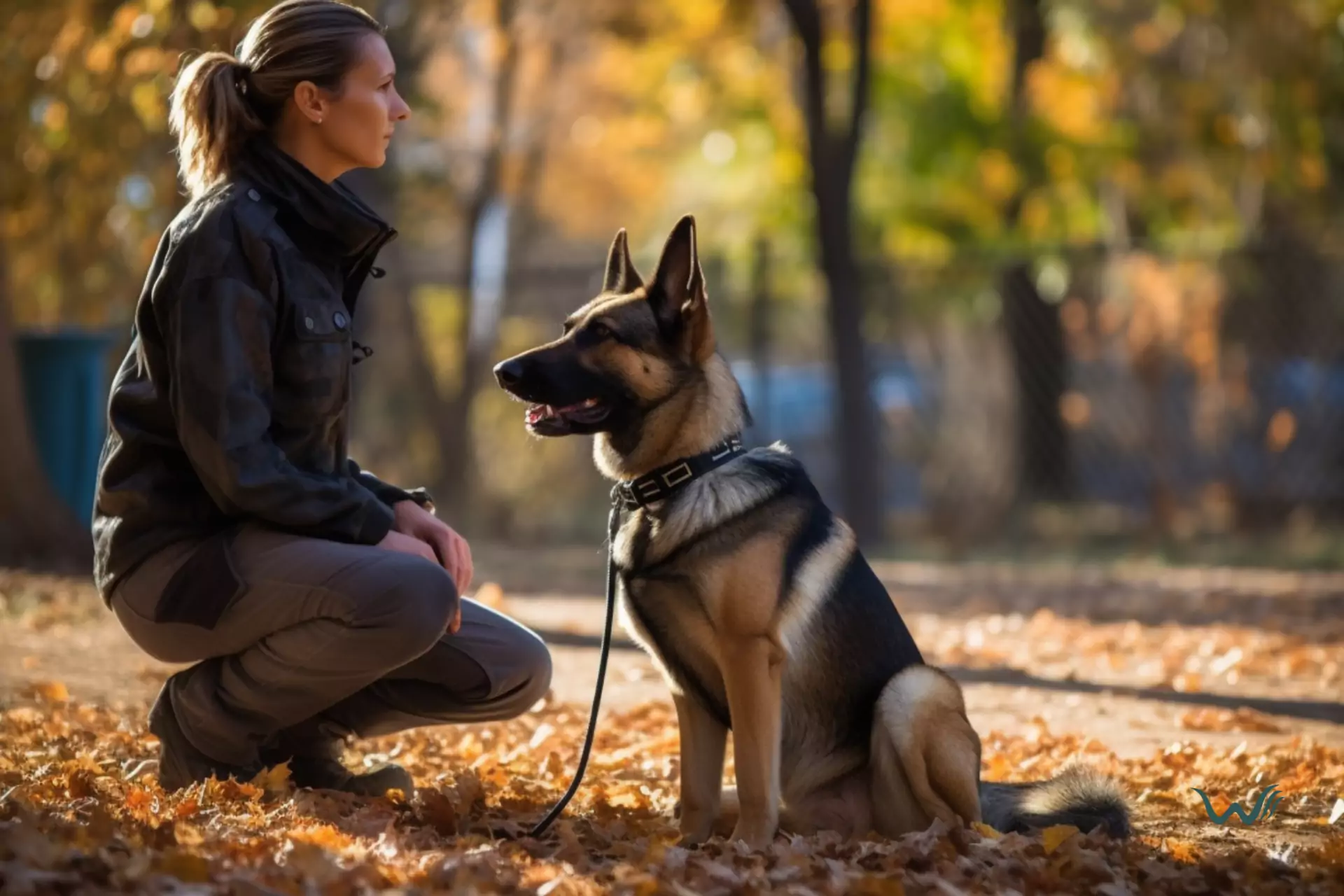

Understanding The Benefits Of Crate Training For Housebreaking Puppies
by Tayyaba Amir
Last updated: April 23, 2024
Verified and Approved by:
Angela Morris,
MSW, LCSW
Fact Checked

Are you ready to embark on the journey of housebreaking your adorable new puppy? Well, buckle up because crate training is here to save the day! Picture this: crate training is like the secret weapon that will help you conquer the challenges of housebreaking with ease. It’s like having a magical toolbox filled with all the tools you need to teach your pup proper elimination habits, prevent destructive behavior, and build a strong bond of trust.
When you think of crate training, don’t let the word “crate” fool you. It’s not about confining your puppy to a small, lonely space. Instead, think of it as establishing a safe and comfortable den-like environment for your furry friend. Just like how a cozy nest provides a sense of security to a bird, a crate offers your puppy a place of their own, where they can feel safe and at ease. By creating this special space, you’ll be giving your pup a sense of security and ownership, which will ultimately contribute to their well-being and happiness.
But that’s not all crate training has to offer! It’s also an effective tool for teaching your puppy proper elimination habits, preventing destructive behavior, and building a strong bond of trust. So, let’s jump right in and uncover the wonders of crate training for housebreaking puppies.
Key Takeaways
- Crate training provides a safe and secure den-like environment for puppies.
- It helps with housebreaking by teaching puppies to hold their bladder and bowels.
- Crate training prevents destructive behavior by giving puppies a designated area for their natural behaviors.
- It establishes boundaries and teaches puppies self-control.
What is Crate Training?
Crate training involves using a crate or a small enclosed area to confine your puppy when you are unable to supervise them. It may seem like a small space, but for your puppy, it can feel like their own cozy den. Dogs are den animals by nature, so having a crate can fulfill their instinctual need for a den-like environment. This can help them feel safe and secure, reducing anxiety and providing them with a sense of comfort.
Not only does crate training provide a safe and secure space for your puppy, but it also helps with housebreaking. Dogs naturally don’t want to soil their sleeping area, so when properly crate trained, they’ll learn to hold their bladder and bowels until they’re let outside. This can greatly speed up the housebreaking process and prevent accidents inside your home.
Additionally, crate training can help prevent destructive behaviors that are often a result of boredom or anxiety. By providing your puppy with a designated space of their own, you’re giving them a place to retreat to when they need some alone time or when they’re feeling overwhelmed. This can prevent them from getting into trouble or causing damage to your belongings. So not only does crate training benefit you by making housebreaking easier, but it also benefits your puppy by providing them with a safe and secure space to call their own.
Establishing a Safe and Comfortable Space
Creating a cozy den-like environment in the crate can help your new puppy feel secure and relaxed. Just like humans, dogs have a natural instinct to seek out a safe and comfortable space to relax and sleep. By providing your puppy with a crate that is warm and inviting, you are giving them a place that they can call their own. This can be especially important during the housebreaking process, as it helps to establish a routine and a sense of security for your furry friend.
To help you create the perfect den-like environment for your puppy, here is a table with some ideas for making their crate cozy and comfortable:
| Item | Purpose |
|---|---|
| Soft Blanket or Bed | Provides a comfortable surface for your puppy to lay on |
| Toys or Chew Bones | Helps keep your puppy entertained and prevents boredom |
| Water Bowl | Ensures your puppy stays hydrated throughout the day |
| Puppy Pads or Newspapers | Provides a designated spot for your puppy to relieve themselves |
| Crate Cover | Creates a dark and enclosed space that mimics a den-like environment |
It’s important to introduce your puppy to their crate positively and gently. Start by placing treats or toys inside the crate to encourage them to explore and enter on their own. Gradually increase the amount of time your puppy spends in the crate, making sure to reward them with praise and treats for good behavior. With time and patience, your puppy will come to see their crate as a safe and comfortable space where they can rest and relax.
Teaching Proper Elimination Habits
Developing good habits for elimination is important when it comes to raising a well-behaved and clean companion. By crate training your puppy, you can effectively teach them proper elimination habits.
Here’s how crate training can help:
- Creates a routine: When your puppy is confined to their crate, they learn to hold their bladder and bowels until they are let out. This helps establish a routine for elimination, making it easier for you to predict when they need to go outside.
- Prevents accidents: The crate acts as a safe and secure space for your puppy, reducing the chances of them having accidents inside the house. It teaches them to associate elimination with going outside, encouraging them to hold it until they are taken to their designated potty area.
Using a crate for housebreaking your puppy not only helps them develop good elimination habits, but it also ensures a clean and hygienic living environment for both you and your furry friend.
Preventing Destructive Behavior
To prevent destructive behavior, it’s essential to provide puppies with a safe and secure space, like a crate, where they can feel calm and relaxed. Puppies have a natural instinct to chew on things and explore their surroundings, which can often lead to destructive behavior if not properly managed. By crate training your puppy, you are giving them a designated area where they can safely indulge in their natural behaviors without causing any harm to themselves or your belongings.
A crate provides a sense of security and comfort for puppies, similar to a den in the wild. When they have their own space, they are less likely to engage in destructive behaviors out of anxiety or boredom. It becomes their retreat, where they can go to relax and recharge.
Additionally, crate training helps establish boundaries and teaches puppies self-control. They learn to associate the crate with positive experiences, such as receiving treats or praise, and this positive reinforcement encourages them to view the crate as a safe and enjoyable place.
By providing your puppy with a crate, you are not only preventing destructive behavior but also promoting their overall well-being. They will learn to be independent and confident, as they have a space they can retreat to when they need some alone time. Crate training also helps with housebreaking, as puppies are less likely to eliminate in their crate, teaching them proper elimination habits.
Building Trust and Bonding with Your Puppy
Building a strong bond with your furry friend is essential for a successful relationship. When you first bring your new puppy home, it’s important to establish trust and build a strong foundation of love and understanding. One way to do this is through crate training. By using a crate, you can create a safe and secure space for your puppy, which will help them feel comfortable and protected. This will not only help with housebreaking, but it will also help your puppy feel more secure and confident in their new environment.
Crate training can be a positive and rewarding experience for both you and your puppy. It provides a sense of structure and routine, which is important for puppies as they learn boundaries and expectations. By consistently using the crate as a safe space, you are teaching your puppy that they have a place to go when they need some time alone or when they need to relax. This helps to build trust between you and your puppy, as they learn that you will always provide them with a safe and secure environment.
In addition to building trust, crate training can also help to strengthen the bond between you and your puppy. When you spend time together in the crate, whether it’s playing, training, or just relaxing, you are creating positive associations and building a deeper connection. Your puppy will come to see the crate as a place of comfort and security, and they will associate that feeling with being with you. This will strengthen your bond and make your puppy more eager to please and follow your lead.
Crate training is an effective way to build trust and bond with your puppy. It provides a safe and secure space for them, while also teaching them important boundaries and expectations. By spending time together in the crate, you are creating positive associations and strengthening your bond.
Frequently Asked Questions
How long does it typically take for a puppy to become fully crate-trained?
You’ll be amazed at how quickly your puppy can become a crate pro! In just a few weeks, they’ll be as comfortable as a fish in water, and you’ll have a well-behaved, housebroken companion.
Can crate training be used for adult dogs as well, or is it only effective for puppies?
Yes, crate training can be used for adult dogs too! It’s not just for puppies. Crate training provides a safe and cozy space for your furry friend and can help with potty training, preventing destructive behavior, and reducing anxiety.
What do I do if my puppy cries or whines while in the crate?
If your puppy cries or whines while in the crate, it’s important to resist the urge to immediately let them out. Instead, try comforting them with soothing words or a blanket, and gradually increase the time they spend in the crate to help them adjust.
Is it necessary to cover the crate with a blanket or should it be left open?
Covering the crate with a blanket is like creating a cozy den for your puppy, providing a sense of security and comfort. It helps them feel safe, reducing anxiety and promoting a more peaceful sleep.
Can crate training cause any negative effects or behavior problems in puppies?
Crate training can be a great tool for housebreaking puppies, but it’s important to be aware of potential negative effects. When used incorrectly or for excessive periods, it can lead to anxiety or behavior problems in some puppies.
Certify Your Emotional Support Animal Today

Why You Can Rely on Us?
At Wellness Wag, we believe your pet deserves care rooted in both science and compassion. Each article is carefully researched, written in clear language for pet owners, and then reviewed by qualified professionals to ensure the information is evidence-based, current, and practical for real-life care. Our goal is to help you feel confident in making informed decisions about your pet’s health and well-being.
Reviewed by
Angela Morris, MSW, LCSW
Angela is a licensed clinical social worker with 20 years of experience in patient advocacy and community mental health. She has assisted numerous clients with ESA evaluations and brings a deep understanding of disability accommodations, ensuring that all information is accurate, supportive, and practical.

Written by :
Tayyaba Amir
Last Updated :
April 23, 2024










